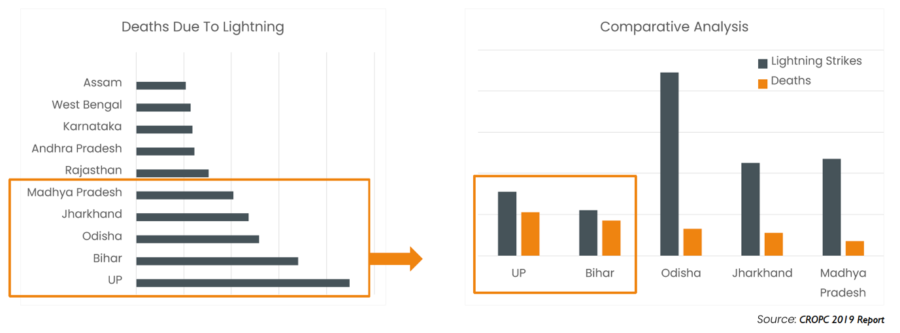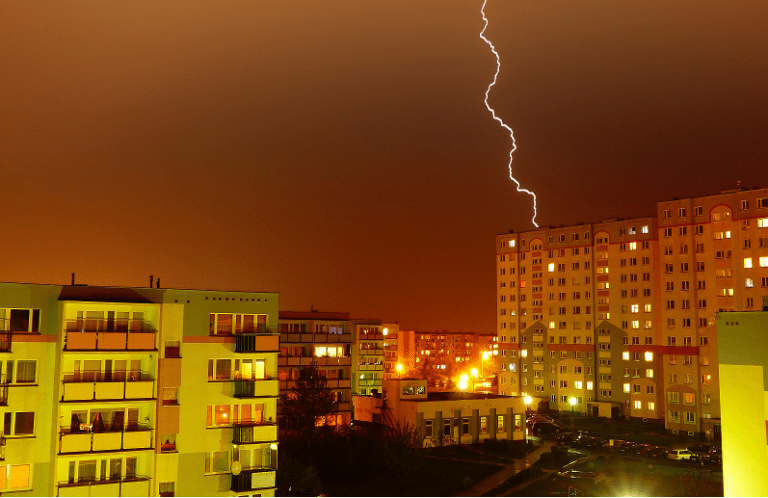The importance of Lightning Protection!
When we imagine natural disasters, often the first things to come to mind are the cyclones, earthquakes and floods that can affect us on the Indian subcontinent. Sometimes we turn on the TV and can see the tornadoes that wreak havoc through the American Mid-west or the fires that are affecting the Australian bush. In all these cases, unsuspecting homeowners and building societies were completely taken by surprise by the unimaginable damage that ensued and that they often cannot prepare to handle.
Despite being a weather threat that affects people across the world, there is one natural disaster that homeowners and building societies often do not think about until it is too late. But people can prepare and protect themselves against this threat – Natural Disaster Lightning. These beautiful and powerful natural occurrences are a photographer’s best friend. They present awe-inspiring scenes that can capture an audience’s imagination. But they also have a huge potential to cause damage to structures, homes, the natural environment, and living beings. A discharge of lightning can carry over 100 million volts of electricity which can easily cause damage to any kind of structure – they can destroy monuments, explode walls and often be the cause of devastating fires. With new and expensive technology, it might be possible to foresee lightning strikes in a vicinity maybe 15 minutes before they occur, it is impossible to pinpoint exactly where it would strike. Due to their devastating impact, there are steps that any homeowner or building manager can take to minimise the damage of a strike.
Educate Yourself Against Natural Disaster of Lightning
According to CROPC 2019 Report, there were as many as 6.5 million lightning strikes that occurred only in the four months from April to July 2019. Out of these 6.5 million lightning strikes, 2.3 million were Cloud to Ground lightning strikes that impacted locations across the Indian subcontinent. These were the statistics for only 4 months and these numbers make India one of the most vulnerable geographies in the world for lightning strikes. Lightning does not discriminate on geography and strikes across the entire country.

However, Uttar Pradesh, Bihar, and Odisha lead the country for deaths due to lightning strikes.
Protection from Natural Disaster – Lightning
For homeowners and building societies, who want to ensure the safety of their residents against the odds of lightning striking their structure, a professionally designed and installed lightning protection system is the most viable idea. This professionally designed and installed lightning protection system would work by channeling the immense energy of lightning strikes along the path of least resistance, providing a safe path for it into the earth. Axis has been in the business of manufacturing material for Lightning Protection Systems for exports around the world since 1994 and through this experience, we have learned the importance to the end customer that they should only use products that comply to strict international standards for lightning protection and earthing such as IEC 62561 or UL 467 and UL 96. The National Building Code of India also has strict regulations on the material used for lightning protection systems. Improper material use can lead to serious consequences and in the worst-case scenario, it may not provide any protection to the structure at all. The use of an experienced lightning protection contractor is also important to ensure the correct placement and fitting of the entire system. Building societies or homeowners should not try to install a lightning protection system by themselves.
Usually, this kind of lightning protection system is made up of the following components:
- “Air Terminals” or “Lightning Rods” or “Franklin Rods” or “Lightning Arrester” – these are usually made out of copper and are set on the roof of the structure at regular intervals as per the standard design requirements.
- Down conductors are made of strips of copper, copper-clad steel or braided cables of copper or aluminium. These conductors connect the air terminals to the rest of the system and the earth rods.
- Earth rods or Ground rods, which are driven deep in the earth. These help direct the current into the ground.
- Bonding connects the metallic components of the structure such as pipes or roof structures to the ground rods to ensure conductivity and prevent side flashing.
- Surge Protection Devices are discussed more in detail below.
Surge Protection for some Extra Protection
With the increasing importance of electronic devices in every aspect of our modern personal and professional lives, it becomes increasingly important that we protect these devices even from small indirect lightning strikes. Even a small strike that hits the ground around a structure can possibly damage sensitive electronic devices inside the structure by causing a surge. This surge can cause all the electronic devices in a home such as refrigerators, televisions, computers, etc. completely inoperable, causing severe financial damage. In structures such as hospitals or data centers where the equipment is even more sensitive, protection against these surges becomes paramount. We have explained the importance of surge protection devices and their usage in more detail at our blog: Surge Protection Devices (SPD)
For more information on protecting yourself, your family, your home, or your building society, please feel free to contact us for more information.
You can also get more information on our video on the basics of Lightning Protection.
Visit us at axis-india.com for more information.







